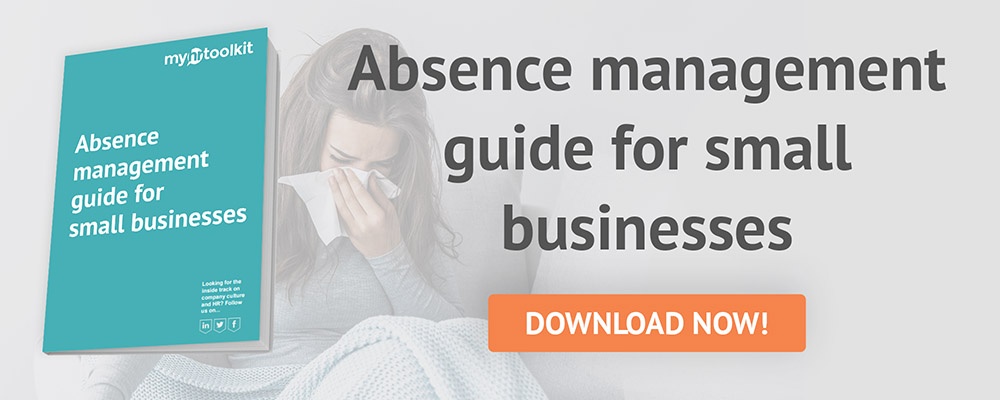What is day one absence management and what is the business philosophy that underpins it? HR consultant Gemma Dale explores the concept of day one absence management and how small businesses can adopt it effectively.
Absence management is an important subject for many organisations, whatever their size or structure, largely because employee absence from work represents a significant cost both financially and operationally. It typically has several elements:
- Measuring and monitoring absence levels
- Identifying and addressing the causes of absence
- Supporting employees to return to work after ill-health
- Supporting employees with long-term health conditions, including making reasonable adjustments
- Managing inappropriate absence through company policies and procedures
- Training managers to have conversations about health and attendance
- Developing policies and procedures about absence
- Preventing or reducing absence from work
Strategies to reduce absence and support attendance will vary depending on the type of organisation, the work undertaken, and the specific individual situations that arise.
What is day one absence management?
Day one absence management can be described in two ways. Firstly, it is a service that can be outsourced to support effective and timely absence management. Secondly, it can also be considered a philosophy – an overall approach to managing absence in the workplace.
Day one absence management as a service
Usually, an outsourced provider will support an organisation to monitor, understand, and manage their absence through a variety of services. These typically include a call answering service (to which employees report their absence), reporting on absence data at organisational, team or individual levels, support for people managers in absence conversations, and occupational health services. Some day one services also include the provision of advice and support to employees on their specific health issue. Employees often speak directly with qualified medical personnel, helping to ensure conversations are practically focused on health and wellbeing.
Day one absence management as a philosophy
Rather than a service, this is more about taking prompt action when employees are unwell. There are some medical conditions, such as when employees are experiencing poor mental health, that will benefit from a prompt organisational (or manager) response, providing early intervention and support. This is especially helpful when such referrals can help employees to access specific support such, as counselling or rehabilitation services. Taking a ‘day one’ approach to absence management can help to ensure that managers are focused on managing absence, having effective conversations, and taking action where appropriate.
Do you need a day one absence management service?

Providers claim that their services will help organisations to reduce their absence levels and, through quick interventions and referrals, help employees to stay at work or return from absence more quickly. Absence may become more visible through the provision of detailed data, which can then help employers to make informed decisions about preventing and tackling absence across the organisation. Employees may also value being able to access medical advice where this is part of the provided service.
However, it can be costly. These services are usually provided on a per month, per employee basis – and this can quickly add up to a significant sum with a large workforce. Not all employees will welcome an approach such as this, perhaps finding it intrusive or unnecessary. Contacting a third party to report absence can reduce dialogue between employee and manager, something that can be important for keeping in touch with the workplace and supporting the return to work.
A day one absence management service won’t be right for every organisation. Where absence is already well managed and relatively low, the financial cost of implementing a service may well outweigh the benefits. In such circumstances, organisations may find it more appropriate to focus on the other elements of absence management and using any existing HR software (such as the myhrtoolkit absence management system) to record and monitor absence fully. Where absence is high and placing a high administrative burden on people managers, an outsourced service can provide a potential benefit.
Tips for implementing day one absence management
Employers who are considering implementing a day one absence management service should consider some of the following:
Assessing providers
Meet a variety of potential providers, making sure to understand their internal processes and data governance protocols, and seek information on how their services have performed (especially in relation to absence levels) within other comparable organisations.
Clear communication
Employees obviously need to know what is expected of them when reporting absence from work. When introducing an outsourced approach, communication plans should also include why such a process is being implemented, as well as assurances about confidentiality and personal data to alleviate potential concerns.
Reviewing benefits and costs
Organisations should establish a regular review of the service provision, making sure that it is delivering value for money and leading to overall reduction of absence – or its more effective management. Ensure that this review also includes employee feedback.
Where an outsourced service is not required, employers and managers should be mindful that there are times when a day one approach to supporting employees experiencing ill-health can be helpful, especially when the employee is experiencing poor mental health or serious conditions likely to impact upon long-term employment. Early and regular dialogue along with prompt support can make all the difference.

Written by Gemma Dale
Gemma Dale is an experienced senior HR professional, CIPD Chartered Fellow, HEA Fellow, and a regular speaker and writer on a variety of HR topics. Gemma is the co-author of the book 'Flexible Working' published by Kogan Page in 2020. She is also a lecturer in the Business School at Liverpool John Moores University and runs her own business, The Work Consultancy.


 Holiday Planner
Holiday Planner Absence Management
Absence Management Performance Management
Performance Management Staff Management
Staff Management Document Management
Document Management Reporting
Reporting Health and Safety Management
Health and Safety Management Task Management
Task Management Security Centre
Security Centre Self Service
Self Service Mobile
Mobile




